#Taoist immortality
Text
How to Kill Sun Wukong
Have you ever wondered what it would take to kill Sun Wukong? My new article describes a ritual borrowed from Investiture of the Gods (Fengshen yanyi, 封神演義, c. 1620) that would certainly kill our hero. It involves a secret, spiritual assault from a distance. That way, the villain doesn't have to worry about getting smashed into hamburger or ripped to shreds by an angry monkey immortal.
The ritual steals an immortal's spirit, tethers it to a straw effigy, and then kills the target by shooting the effigy in the eyes and heart with arrows.
#Sun Wukong#Monkey King#Journey to the West#JTTW#Immortal#Immortality#elixir of immortality#Chinese immortal#Taoist immortality#Investiture of the Gods#Creation of the Gods#how to kill an immortal#how to kill a god#Lego Monkie Kid#LMK#monkey
238 notes
·
View notes
Photo
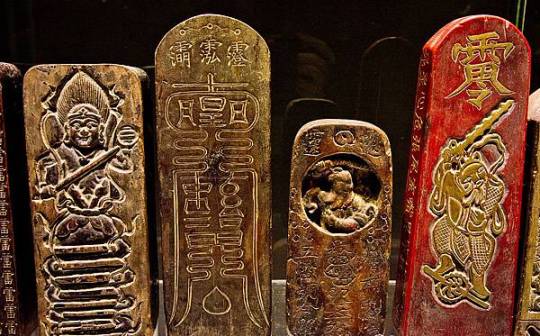
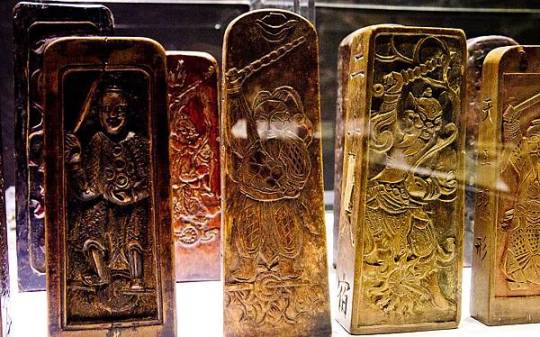
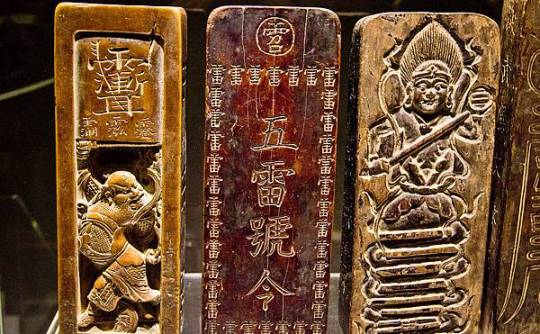
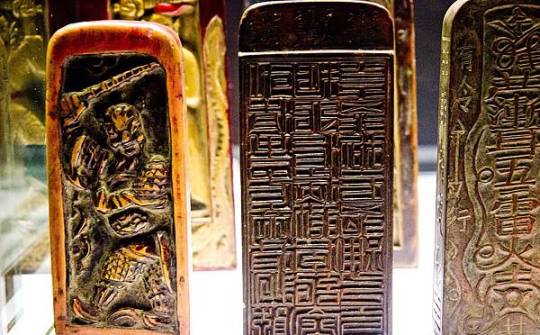
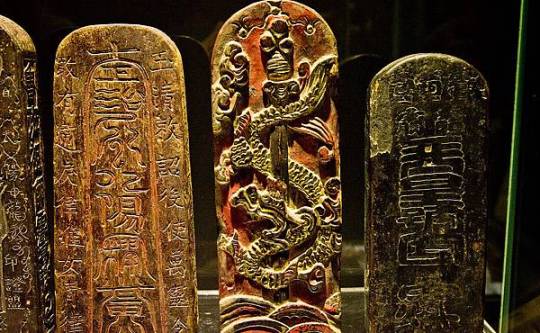
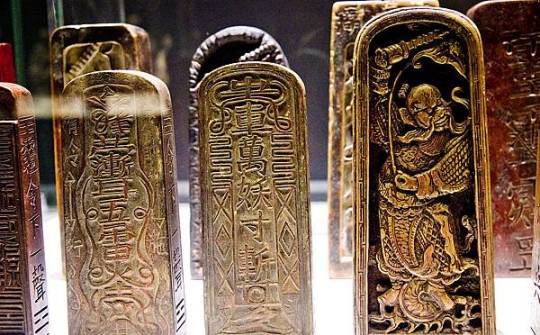
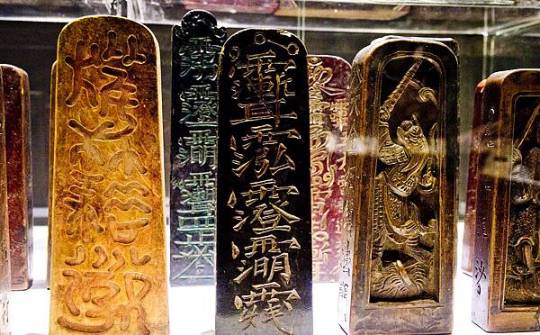
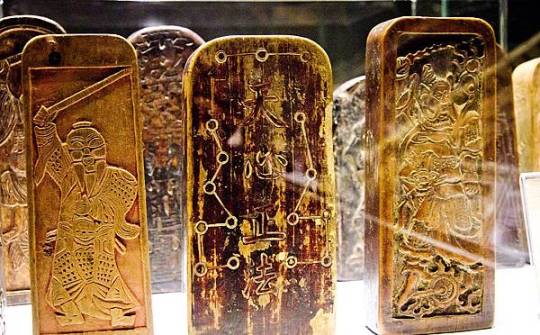
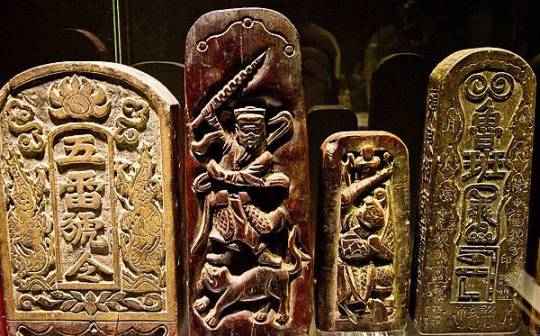
Ming and Qing Taoist tokens (Ling Pai 令牌 aka Lei Ling 雷令or Wu Lei Hao Ling 五雷號令) used in the Thunder Rites (Lei Fa 雷法). Mostly from Lushan Taoist school (閭山派), Fujian.
The tokens are made of wood, often peach wood or jujube, however, jade, ivory, bamboo root, etc. are allowed. The rounded top represents Heavens and the rectangular base – Earth.
The Ling Pai are engraved with signs corresponding to those divinities or forces with which the practitioner interacts during the Rites. The patterns and shapes may vary depending on the Taoist school and lineage, but the overall structure remains recognizable.
Photo: © Lin Mengyi, Xuanwu Daomen Taoist Research Center (林孟毅 玄武道門 道教研究中心), Taiwan.
#qing dynasty#qing#ming dynasty#ming#taoism#taoist#taoist immortal#yuan dynasty#taoist sorcery#taoist magic#chinese mythology#daoism#daoist#chinese myth#chinese culture#ancient china#taoist spell#fu talisman#taoist talisman#taoist ritual#leifa#taoist seals#thunder rites#雷法#xuanwu#真武#zhenwu#玄武#玄天上帝#xuantian shangdi
224 notes
·
View notes
Text
So, according to the notes of the substack Sun Wukong represents the mind, and by the virtue of being a monkey he also represents cunningness, which is perfect symbolism of how he has acted in the plot so far.
Sun Wukong has always been daring, and resourceful since he was born, but cunningness is something that he started to practice, and outdo himself in many ways once he came in contact with humans. The monkey king didn't need to be cunning when it was only him, and his monkey family on Flower - Fruit Mountain, but after seeing human civilization, gaining immortality, and coming back to see his family being terrorized Sun Wukong is now extremely aware of how the outside world, and heaven can use their military, or otherwise powers to attack Flower - Fruit Mountain, hence the need to train, and actual weapons.
Which is where Sun Wukong now employs his mind to come up with the perfect stealth plan to STEAL weapons from a human kingdom. In the notes it says the very second precet of taoism; the one that Sun Wukong studied to gain immortality, is "no stealing", and it's so funny how it only took a few days of being away from his teacher for Sun Wukong to immediatly ignore the rules that he studied for many years.
However, it is very clear that Sun Wukong only wants the training, and the weapons for the sole purpose of having a guarantee that his family, and their freedom won't be in danger of falling apart like it almost did with the Monstrous King of Havoc. Not to invade any countries, nor subject any other being with violence, just something that could help the Sun Monkey clan if they ever (I hope not) need to take arms to defend Flower - Fruit Mountain.
Now, Sun Wukong himself? Something tells me that he is going to cause more havoc with his treasure rod violence be damned, but let's see, maybe there are many benefits of being a magical monkey with a staff to hit things with.
#Sun Wukong came back from becoming a taoist immortal and immediatly went to steal#It's so funny even with the very serious reasonings of why he needs his family to be ready to fight#journey to the west daily#Jttwdaily#journey to the west#sun wukong
39 notes
·
View notes
Text
WWX raising the dead is culturally unacceptable, why? Because CQL censored that part due to the current government regulation of even censoring the color of blood or bloody wounds in media.
Also China's current regulation: LGBTQ is not Culturally approved!
Also Chinese real-world orthodox culture: LGBTQ is taboo!
Does that mean those FUcKInN DaMn GAYs WangXian are Culturally and Morally unacceptable??
#That is why you not only have to care about CN culture but also care about XianXia culture#gays are unacceptable in CN culture but in XianXia culture Taoist Partner is irrelevant of gender#please do not forget MDZS is not your normal ancient china#It is XianXia goddamn it!!!#Killing people is morally unacceptable in Chinese culture but in XianXia culture killing for revenge is justified#raising the dead is culturally unacceptable for others but in Chinese real Taoism it is acceptable and MDZS is a damn TAOISM story#Attempting to be immortal is disrespectful to the real GOD in other culture but in China it is acceptable goddamn it and MDZS#Do not use what is unacceptable and disrespectful on real world while disregarding the context of MDZS as a literature#Im so fuckin done with mdzs fandom#Why are people so adamant to ignore the context of MDZS?????#It is either they ignore MDZS is Chinese or literally take MDZS as “normal chinese world” and ignore the XianXia setting!#mdzs#mo dao zu shi#wei wuxian
20 notes
·
View notes
Note
I was reading some Chinese texts and stories, and I have seen that while the immortals have their magic, they despise sorcery. Why is sorcery seen as negative by immortals and why are they different? (like, I think it's mentioned that Shen Gongbao relied more on sorcery even thought he has an immortal teacher)
I'm afraid I don't quite understand the English difference of how 'sorcery' and 'magic' are different things let alone how the translator from what you read translated the original characters. I have never seen any king of cultivation in Daoism being translated as 'sorcery' so I can't say what really say what the original characters could be talking about. It could be talking about 巫术 which I think sometimes include blood rituals but never seen in stories as something ‘bad’ or even acknowledged in Daoist stories. If anything, I think they were more regarded as doctors with unusual methods and fairly good with technology. But I really only seen it to describe Western wizards/witches the most so I cannot say how mush it is used in Daoist stories.
As far as I have been aware Shen Gongbao uses cultivation just as any other immortal and I do not think that he has ever killed/taken his cultivation from any other living creature. That is the only thing I can assume would be 'bad' as it is feeding off another's life force or perhaps even just meaning 'using cultivation for trouble.' I recall that most of his 'evil' deeds come more from Shen Gongbao's ability to manipulate people are his words and being a vengeful man rather than anything dark with his cultivation.
The best guess I can give you is that Shen Gongbao in your translation is the bad guy of the narrative and thus the term 'sorcery' has negative implications in Western term and that is why it is used. Similar to how 'fairy' is used for 仙 when 'immortal' is more proper but this chance depends on whether the immortal is a woman or not.
You can take a read yourself but I think it is just a translation preference.
"Taoism branched from witchcraft. During the Jin and Tang dynasties, due to the participation and compilation of literati and the absorption of a large number of Buddhist scriptures and theories, the original religious form of witchcraft and Taoism became theorized, and Taoism developed a large distance from witchcraft. Taoism has since risen to the level of the upper ruling class, while shamanism has continued to flow among the people. Since the ruling class in history banned witchcraft and " obscene sacrifices" from an orthodox position, the survival of witchcraft has become very difficult. Therefore, witchcraft began to seek survival and a way out. First of all, it was to get closer to Taoism. So that the people also agree that they belong to Taoism. As this development continued, witchcraft and Taoism gradually merged, forming a form of shamanism consisting of both witchcraft and Taoism, and the "two gates of Taoism and Law", namely internal witchcraft and external Taoism.
First of all, shamanism must identify Taishang Laojun , the ancestor god of Taoism , as its leader to confirm that shamanism also belongs to "Laojun's religion" or "Laojun's sect". So based on the legend of Laozi , I compiled the origin of Taishang Laojun, thinking that witchcraft became the original version of Taoism. In addition to moving Taishang Laojun, Zhang Tianshi , Sanqing , Sanyuan, Sanguan, Wuyue , Sidu , Xuantian God and many Taoist gods were also moved into the witch altar, and they were named "Taishang Wuling Laojun" Or "The Supreme Three-Yuan Heart Zhengfa", "The Supreme Five Thunder Purple Micro Thunder Court" and other titles were listed on it, and they absorbed a large number of Taoist scriptures such as "The Supreme Sutra of Changing Purity", "The Supreme Xuantian Miao Sutra", "Tai Shang Zi Wei Treasure Repentance", "Tai Shang Laojun Xing Treasure Repentance", "Three Officials Sutra", "The Three Officials of Heaven, Earth and Water to Eliminate Disasters and Sinless Confessions", "Eleven Days", "South Dou Sutra", The Beidou Sutra and other sutras and confessions are enriched in the witchcraft and Taoist altar with Taoist rituals.
- "A Discussion on the Formation of Witch-Tao Culture in the Symbiosis Cultural Circle" by Ye Mingsheng
#anon ask#anonymous#anon#ask#Shen Gongbao#fsyy#fengshen yanyi#romance of the three kingdoms#thee kingdoms romance#investiture of the gods#again I'm not really familiar with a lot of these terms#I would suggest people doing their own research because there is so much overlaying information and practices that I cannot begin to#summarize into something generalizable and esp with something like shamanism and how the evolution of these practices either differ or merg#there are thousands of years of history not to mention interconnections that could be layered or nuanced and am not an expert when it comes#to the changes of laws and how this effects in hundreds of years of different dynasties#personally still think it's just a translation choice since Shen Gongbao is a Taoist immortal and REALLY hasn't done anything that could be#considered out of the normal for any other immortal when it comes to his powers at least. Just that he is a jerk. But not enough of a jerk#to stop being given titles in heaven and still being seen as an important figure#take it as you will
10 notes
·
View notes
Note
If the Samadhi Fire was sealed away in the rings, how was Sun Wukong put in the Trigram Furnace (the same furnace MK was trapped in)? If I recall, he was put in there as punishment by the Celestial Realm.
...
ok, your first problem is that swk was put in the trigram furnace waaaaaaaaaay before the samadhi fire was sealed away into rings, because he was put in before he rampaged through heaven and before he went on the journey, where in the show its clearly shown that they sealed the rings away either during or after the journey
second problem is that i dont think ive ever seen anything saying the samadhi fire powers the 8 trigrams furnace im not positive where you got that idea
#mk#ask#the 8 trigrams furnace was kind of like a taoist metaphor for one-ness#with the trigrams being symbols to explain the creation of pills of immortality
26 notes
·
View notes
Text
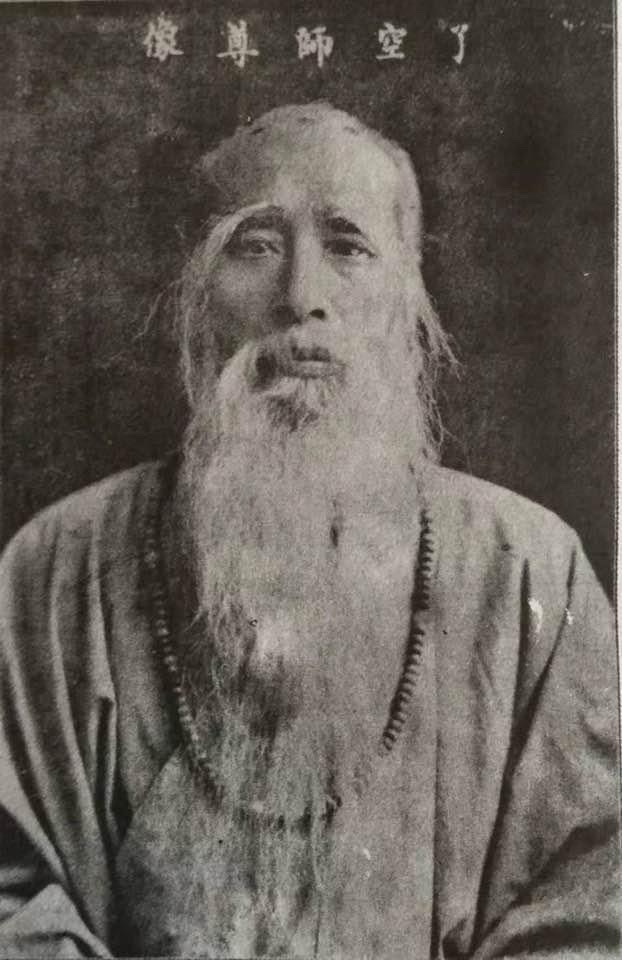
Lao Zhan. The Master at U Binlow. According to legend, at that time he was far beyond 200 years.
25 notes
·
View notes
Text
I think I just experienced posting wizardry that turned me into a toyosatomimi no mikoposter by implication.
#touhou#surreal#“i have an auditory processing disorder!” I call out as I shrink into a fat-assed Taoist immortal with a sword and headphones
8 notes
·
View notes
Text
I love it when people make fics about Wukong and his first Master because at some point there’s gunna be angst and my goblin side loves it!
GIVE ME MORE!!!
#lego monkie kid#jttw#sun wukong#monkie kid sun wukong#jttw sun wukong#immortal Taoist#immortal daoist#Subodhi#angst#I love it
23 notes
·
View notes
Text
Reserved for the Gods: Only Two Humans Have Tasted the Chinese Peaches of Immortality | Ancient Origins
Reserved for the Gods: Only Two Humans Have Tasted the Chinese Peaches of Immortality | Ancient Origins
https://www.ancient-origins.net/myths-legends-asia/reserved-gods-only-two-humans-have-tasted-chinese-peaches-immortality-009596

View On WordPress
#China#Chinese#Dongfang Suo#Emperor Wu of Han#Eternal Youth#Goddess#Immortality#Jade Emperor#Jade Pool#Journey to the West#King Mu of Zhou#Kunlun Mountains#Ming Dynasty#Monkey King#Peaches#Queen Mother of the West#Sun Wukong#Taoism#Taoist Pantheon#Xiwangmu#Xiwangwu
6 notes
·
View notes
Text
Lanling Jin
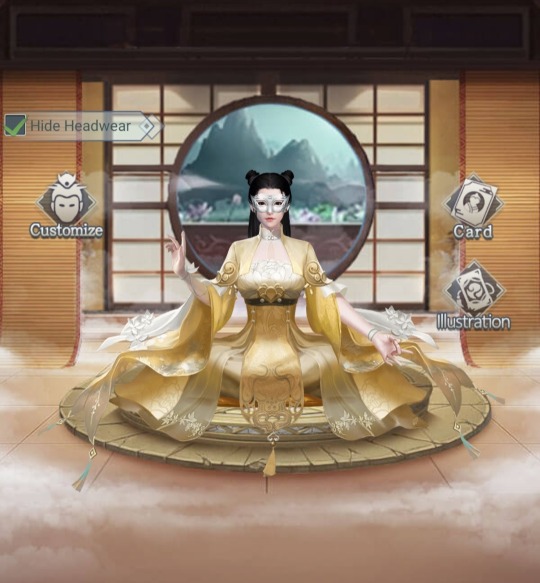
Qinghe Nie
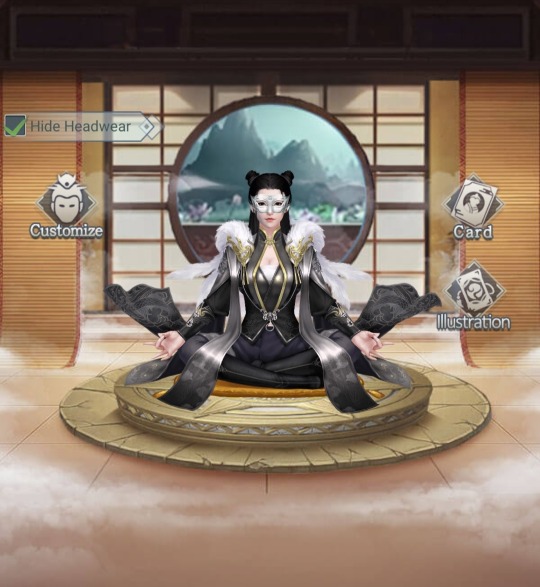
Qishan Wen
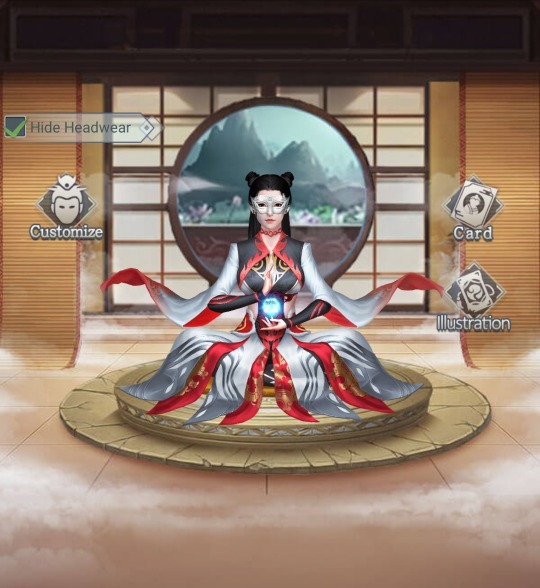
Yunmeng Jiang

Gusu Lan
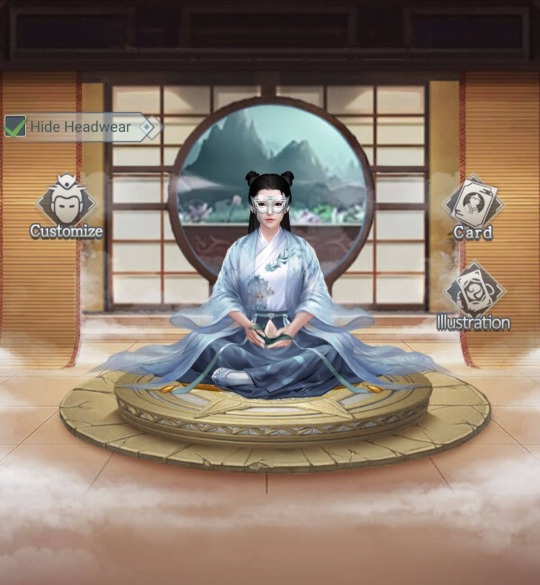
Been playing ‘Immortal Taoist’ (mobile game) & got MDZS vibe in some of the outfits.
6 notes
·
View notes
Text
Jade: Firstborn of Water, Life Nourishing And Power Giving
Jade is the Chinese core value, its pecuniary worth being only a rough expression of the cultural sense. In the heterogeneous thought of the Central Plains, jade has become a cross-cultural symbol, encompassing all the characteristics of the divine.
The centuries-old mythologization of jade is paradoxically based on its basic physical characteristics.
Thus, the regularity with which the gemstone was found in rivers and springs gave rise to the strong belief that all jade originates from water.

View On WordPress
#ancient China#Chinese art#Chinese culture#Chinese customs#Chinese history#Chinese mythology#Chinese philosophy#Han dynasty#Jade#Shang dynasty#Taoism#Zhou dynasty#jadeite#nephrite#taoist alchemy#taoist immortal#taoist#taoist magic#chinese folk religion#taoist deities#dragon#dragons#taoist talisman#talisman#amulet#Yu the Great#chinese nobility#Central Plains#jade emperor#antique jewelry
74 notes
·
View notes
Text
His sole concern was to eat three meals a day and to sleep soundly at night. Having neither duties nor worries, he was free and content to tour the mansions and meet friends, to make new acquaintances and form new alliances at his leisure.
Me: Wow, I didn't believe that giving Sun Wukong an empty title (again) would work, but it seems that this time is actually working! Who knew that simply leaving Monkey be just like in Flower - Fruit Mountain would have such good results, they only needed to leave him happy!
The fucking title of the chapter:
Disrupting the Peach Festival, the Great Sage steals elixir; With revolt in Heaven, many gods would seize the fiend.
Me: Oh.
#Who... Gives a monkey. A MONKEY#The job of taking care of a bunch of heavenly and delicious fruit#They really thought that the monkey wouldn't eat the immortal fruit#Patriarch Subodhi don't look at your disciple his ass is not practicing taoist principles!#journey to the west daily#Jttwdaily#journey to the west#sun wukong
12 notes
·
View notes
Text
Tales of Taoist Weirdos
As my friends and readers are doubtlessly aware, my spiritual practices are deeply influenced by Taoism. From breathing and energy practices, to philosophical advice, there’s a great deal to learn from the huge body of Taoist writings and lore. However, I’d like to discuss the various personalities of Taoist lore and history.
The greater body of Taoism lore and history contains a number of teachers, alchemists, mystics, and evolved human Immortals. Some are learned sages whose idols adorn temples all over the world. Others are acknowledged once in historical records or the credit of an obscure book. Most of them are just a delightful bunch of weirdos.
Gender-bending beloved flute-player Lan Caihe rubs shoulders with with Lü Dongbin, who achieved immortality after a kind of midlife crisis. There’s an alchemist-Prince who ascended to Heaven accompanies by cats and dogs because he spilled an bottle of immortality drugs. Lao-Tzu, creator of the Tao Te Ching, supposedly wrote his book when he just decided screw this and abandoned the corrupt time he lived in. More common tales might include old men with great physical powers, beggars obsessed with the Tao Te Ching, and more.
I adore this about Taoist lore because of how human is all is. A Taoist figure can be both an admirable role model and a cautionary tale separately or at the same time. Great Immortals come from humble beginnings, often learning from serious mistakes, sometimes with the help of more ancient teachers. Drunken poets spout brilliant prose between bouts of boozing in private groves. Even in more worshipful takes, the great figures of Taoism come off as relatable.
This makes Taoist tales and practices associated them more accessible in my opinion. The figures you encounter, historical and mystical, weren’t perfect in life and might even be eccentric in their divine state. If they can become better, if they can achieve peace or Immortality or just be better folks, so can you.
You also don’t feel judged by these diverse group of mystics and magicians. Their tales aren’t ones of moralizing and finger-wagging, but often of helpful figures who’ve “been there.” They’re not there to punish you – well usually, as some of them are willing to cut serious assholes down to size.
Finally, a lot of the tales of various Taoist figures are interesting and many are outright funny. There’s a reason you’ll see them pop in movies, films, television, etc.
The best way to spiritual practice is through being human – and a sense of humor as well.
- Xenofact
0 notes
Text
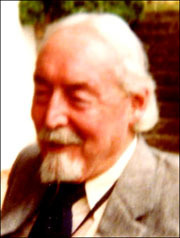
Terence James Stannus Gray, better known by the pen name Wei Wu Wei, was a 20th-century Taoist philosopher and writer. Terence James Stannus Gray was born in Felixstowe, Suffolk, England on 14 September 1895, the son of Harold Stannus Gray and a member of a well-established Irish family. He was raised on an estate at the Gog-Magog Hills outside Cambridge, England. He received a thorough education at Ascham St Vincent's School, Eastbourne, Eton and Oxford University. Early in life he pursued an interest in Egyptology which culminated in the publication of two books on ancient Egyptian history and culture in 1923. This was followed by a period of involvement in the arts in Britain in the 1920s and 1930s as a theorist, theatrical producer, creator of radical "dance-dramas", publisher of several related magazines and author of two related books. He was a major influence on many noted dramatists, poets and dancers of the day, including his cousin Ninette de Valois, founder of the Royal Ballet (which in fact had its origins in his own dance troupe at the Cambridge Festival Theatre which he leased from 1926 to 1933).
He maintained his family's racehorses in England and Ireland and in 1957 his horse Zarathrustra won the Ascot Gold Cup, ridden by renowned jockey Lester Piggott in the first of his eleven wins of that race.
After he had apparently exhausted his interest in the theatre, his thoughts turned towards philosophy and metaphysics. This led to a period of travel throughout Asia, including time spent at Sri Ramana Maharshi's ashram in Tiruvannamalai, India. In 1958, at the age of 63, he saw the first of the "Wei Wu Wei" titles published. The next 16 years saw the appearance of seven subsequent books, including his final work under the further pseudonym "O.O.O." in 1974. During most of this later period he maintained a residence with his wife Natalia Bagration-Imeretinsky in Monaco. He is believed to have known, among others, Lama Anagarika Govinda, Dr. Hubert Benoit, John Blofeld, Douglas Harding, Robert Linssen, Arthur Osborne, Robert Powell and Dr. D. T. Suzuki. He died in 1986 at the age of 90.
Wei Wu Wei's influence, while never widespread, has been profound upon many of those who knew him personally, upon those with whom he corresponded, among them British mathematician and author G. Spencer-Brown and Galen Sharp, as well as upon many who have read his works, including Ramesh Balsekar.
It is apparent from his writings that "Wei Wu Wei" had studied in some depth both Eastern and Western philosophy and metaphysics, as well as the more esoteric teachings of all the great religions. It can also be understood from the writings that he regarded himself as merely one of many seeking so-called "liberation", the works themselves being seen in part as a record of this quest.
#Terence James Stannus Gray#better known by the pen name Wei Wu Wei#Immortal Taoist#wie wu wie#0.0.0.
0 notes
Text
Understanding Death
To understand death, one must first understand not what gives us life, but what gives us the ability to know that we are alive. Animals are alive and do they know they are alive? Animals can grieve and miss their partner, but is that just a reaction to a routine and assistance they no longer have? If you know that you are alive, the normal reaction is to prevent oneself from dying, as much as possible.
The lightbulb is a great analogy. The lightbulb “reads” its environment. It “reads” it by its light reflecting onto the surface of objects and walls. The lightbulb is always on and is connected to its power source. However, if the dim lightbulb is weak, it can barely “sense” only what is near. The lightbulb, even dim and weak, will never cease, because it is always connected to the power source.
When the lightbulb “reads” the objects and walls, the walls and objects are not the lightbulb. The lightbulb bounces its light off of their surfaces and the resulting interactions and disturbances to the rays can then allow the lightbulb to “sense”, “read”, and “know” the objects and walls.
Your lightbulb is your sensory ability. You think that you are what your thoughts are. You think you are your mind, your ego, your consciousness, and your contents of memories and experiences. Your thoughts are the writings on the walls which your lightbulb’s light reflects back from and is able to “sense”, “read”, and “know” what is written, namely, your thoughts and desires. You are not your thoughts. You are not your desires, and you are not your memories. You are that lightbulb. You are that sensory ability that never dies! Your thoughts die with your body. Your desires die with your body. Your memories die with your body. Your sensory ability lives forever!
That is eternal life! True eternal life! Everlasting! Very, very real!!
#death#spirituality#ego#immortality#Soul#meditation#reality#materialism#atheist#atheism#conscience#Neuroscience#Mind#perception#Taoist#taoism#tao#dao#Daoism#daoist#buddhism#buddha#buddhist#hindi#hindu#hinduism#Christian#Christianity#God#trinity
1 note
·
View note